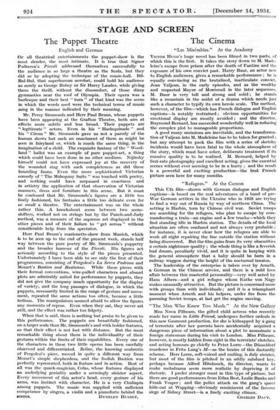The Cinema
"Les Miserables." At the Academy Vic roe Htmo's huge novel has been filmed in two parts, of which this is the first. It takes the story down to M. Made- leine's escape from prison after the death of Fantine and the exposure of his own convict past. Harry Baur, an actor new to English audiences, gives a remarkable performance ; he is equally convincing as the brutalized, inarticulate convict, Jean Valjean, in the early episodes, and as the wealthy and respected Mayor of Montreuil in the later sequences. M. Baur is very tall and strong and solid ; he stands like a mountain in the midst of a drama which needs just such a character to typify its own heroic scale. The method, however, of the film—which has French dialogue and English captions—is notably restrained ; obvious opportunities for emotional display are mostly avoided ; and the director, Raymond Bernard, has succeeded wonderfully well in reducing the complex plot to manageable proportions.
A good many omissions are inevitable, and the transforma- tion of Valjean into M. Madeleine has to be taken for granted ; but any attempt to pack the film with a series of sketchy incidents would have been fatal to the whole atmosphere of the story, which must have sober, deliberate treatment if its massive quality is to be realized. M. Bernard, helped by first-rate photography and excellent acting, gives the essential scenes without ever seeming to be in a hurry ; and the result is a powerful and exciting production—the best French picture seen here for many months.







































 Previous page
Previous page